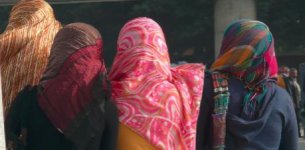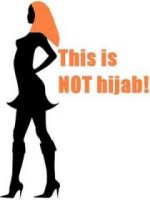'Abd-al Latif
CagePrisoners.com
- Messages
- 3,680
- Reaction score
- 922
- Gender
- Male
- Religion
- Islam
Attractive Hijabs & Shari'ah
Shaikh (Dr) Haitham Al-Haddad
"
On the streets of London, Amsterdam and other big cities in Europe we witness various types of un-Islamic hijabs. Tight Jeans (also known as ‘skinny jeans’), long leather high heeled boots and tight shirts with a head scarf are all typical representations of the kind of hijab that is now being promoted by many young and middle aged Muslim women."
Living in the west, the hijab has become a potent indicator of identity with many non-Muslims viewing it as a political statement. However, it is pertinent to note that the hijab is, first and foremost, an act of worship that women engage in, and an act undertaken to seek the pleasure of one’s Lord.The definition of a hijab is fiercely contested by many Muslims, and unfortunately most of those who engage in the topic are unaware that it is very much defined by Islamic law, the Shari’ah, and not cultural habits or one’s idea of what modesty is, or should be.Shaikh (Dr) Haitham Al-Haddad
"

On the streets of London, Amsterdam and other big cities in Europe we witness various types of un-Islamic hijabs. Tight Jeans (also known as ‘skinny jeans’), long leather high heeled boots and tight shirts with a head scarf are all typical representations of the kind of hijab that is now being promoted by many young and middle aged Muslim women."
In discussing the hijab, Islamic jurists have stipulated a number of conditions for it to be a hijab in the Islamic sense. In brief, these conditions are that one’s clothing must cover the entire body in a way that the shape of the body is not apparent and the material must not be so thin that one can see through it. Clothing should not resemble that which is specific to men nor the disbelievers. It should not be attractive to men, nor should women be perfumed in public. The main aim of hijab is to stop fitnah; females who are attractive by nature attract the gaze of males which then leads to other greater sins such as fornication and adultery. Allah commanded women neither to display their adornment nor to display any form of behaviour that might attract the attention of men. Allah says,
“And tell the believing women to lower their gaze, and protect their private parts and not to show off their adornment except only that which is apparent, and to draw their veils all over Juyubihinna (i.e. their bodies, faces, necks and bosoms, etc.) and not to reveal their adornment except to their husbands, their fathers, their husbands fathers, their sons, their husbands sons, their brothers or their brothers sons, or their sisters sons, or their women, or the female slaves whom their right hands possess, or old male servants who lack vigour, or small children who have no sense of the shame of sex. And let them not stamp their feet so as to reveal what they hide of their adornment. And all of you beg Allah to forgive you all, O believers, that you may be successful.”[SUP][1]
[/SUP]
The Shari’ah also prohibits women from speaking softly for essentially the same reason – to prevent fitnah. Allah says,[/SUP]
“O wives of the Prophet! You are not like any other women. If you keep your duty (to Allah), then be not soft in speech, lest he in whose heart is a disease (of hypocrisy, or evil desire for adultery, etc.) should be moved with desire, but speak in an honourable manner. And stay in your houses, and do not display yourselves like that of the times of ignorance, and perform As-Salat, and give Zakat, and obey Allah and His Messenger.”[SUP][2]
[/SUP]
In fact, scholars from various schools of thought prohibit women from raising their voices in public, even if it be the utterance of the talbiyah during hajj or the adhan (call to prayer) between females. The Shari’ah also prohibits men to visit lonely women and to stay alone with them. It also prohibited men to look at women. Allah says,
“Tell the believing men to lower their gaze (from looking at forbidden things), and protect their private parts (from illegal sexual acts, etc.). That is purer for them. Verily, Allah is All-Aware of what they do.”[SUP][3]
[/SUP]
One of the main problems is limiting the hijab as being a manifestation of female Muslim identity. When France banned the hijab they looked at it as a religious symbol unable to understand the meaning of ibaadah (worship). However, it is unfortunate to see many Muslims treating it as merely a form of identity, and once the symbolic representation has been accomplished the necessity to perform it in a way that meets its conditions laid down by Allah is overlooked. This is one of subtly reprehensible values that many western Muslims have unknowingly adopted. We have to understand that Islamic practices including observing the hijab are actions of ibaadah. They are meant to please Allah, avoid being disobedient, and earn hasanaat in order to attain a high rank in paradise. Allah says,
And (remember) when it was said to them: "Dwell in this town (Jerusalem) and eat therefrom wherever you wish, and say, (O Allah) forgive our sins; and enter the gate prostrate (bowing with humility). We shall forgive you your wrong-doings. We shall increase (the reward) for the good-doers."[SUP][4]
[/SUP]
Whosoever desires the life of the world and its glitter; to them We shall pay in full (the wages of) their deeds therein, and they will have no diminution therein.[SUP][5]
[/SUP]
Some Muslims posit that we should not be strict in calling for the proper observance of many Islamic practices in the west, and as such, we should encourage Muslim women to do as much as they are, without criticism, even if some do not complete such observance. Undoubtedly we agree to encouraging Muslim women to do as much as they can, but correcting wrong or incomplete Islamic practices is an obligation upon those who know.
It is indeed the case that many sisters are completely ignorant about the conditions of the legally valid hijab, and hence it is incumbent upon us to raise awareness of the legal conditions and features of a correct hijab. Knowledge is the cure for many of our mistakes. Advising sisters who undoubtedly wear the hijab out of good intentions as well as educating their parents is another way towards solving this issue. It might be a good idea to print and distribute some leaflets that describe the authentic hijab in a way that goes beyond merely a head covering.
Notes: www.islam21c.com
Sources:
Islam21c requests all the readers of this article, and others, to share it on your facebook, twitter, and other platforms to further spread our efforts.
[1] 24:31
[2] 33:32-33
[3] 24:30
[4] 7:161
[5] 11:15
Last edited:




